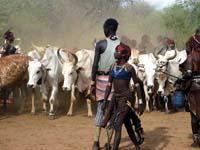Evolution of the ability to drink milk in genes

Many adults are not able to digest lactose, so milk hurts them. For others, milk is essential in food, for example, for countries in northern Europe. A genetic study conducted in 2002 found that its inhabitants have a mutation in the gene encoding the enzyme lactase, which allows them to digest lactose.
However, other populations that drink milk, such as the cattle towns of Africa, do not have that mutation. To solve the mystery, researchers from the University of Maryland have conducted genetic studies in Tanzania, Kenya and Sudan. Thus, three other mutations have demonstrated the ability to digest lactose. One of them is also quite new, but it is the most widespread.
According to the researchers, a representative example of the influence of culture on the genome is the fact that the capacity to digest milk has been obtained by different ways in evolution.





